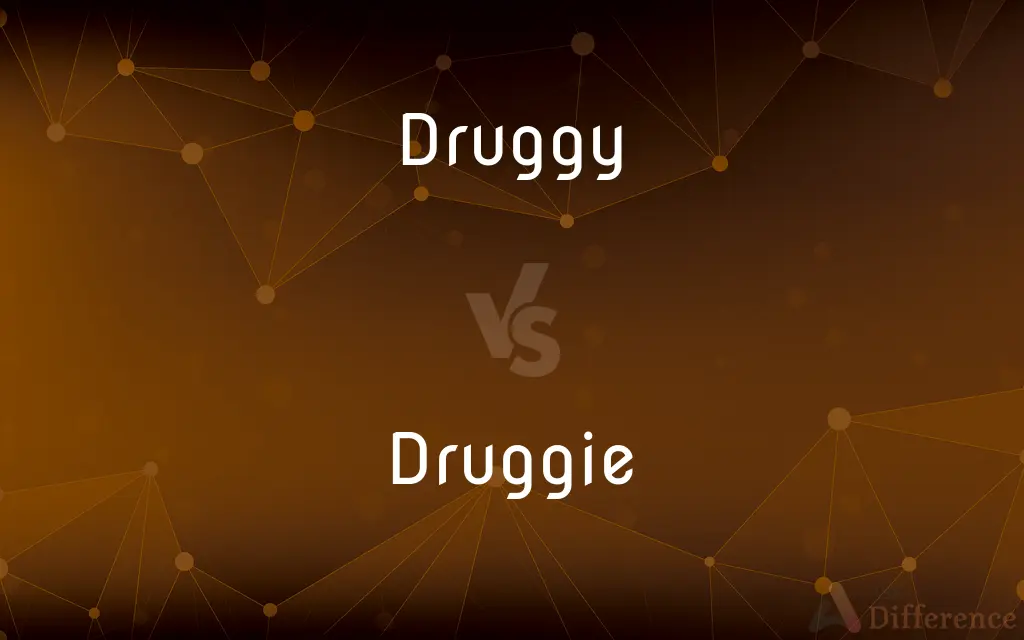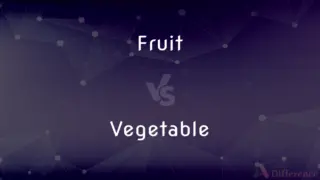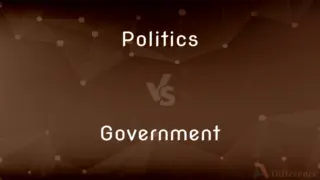Druggy vs. Druggie — What's the Difference?
By Tayyaba Rehman & Fiza Rafique — Updated on April 23, 2024
"Druggy" is an adjective describing something related to drugs or drug effects, while "druggie" is a noun referring to a person who uses drugs excessively.

Difference Between Druggy and Druggie
Table of Contents
ADVERTISEMENT
Key Differences
"Druggy" is used as an adjective to describe environments, effects, or behaviors heavily influenced by or suggestive of drug use. In contrast, "druggie" specifically refers to an individual who uses drugs, typically illicit ones, habitually or excessively.
A "druggy" atmosphere might be one where drug use is apparent or where the environment feels influenced by drugs, such as in certain nightclubs or at parties. On the other hand, a "druggie" is a person who might frequent these environments due to their drug use habits.
The term "druggy" can describe a sensory experience or feeling, such as a "druggy haze" implying a state induced by drugs. Whereas "druggie" is used to label someone, often pejoratively, highlighting their involvement with drugs.
Descriptions using "druggy" might relate to music, movies, or books that evoke or relate to drug culture or effects, like a "druggy film" that portrays drug use vividly. Meanwhile, "druggie" could describe a character in such a film known for their drug use.
While "druggy" can be applied more broadly to contexts, moods, or aesthetics, "druggie" remains a direct reference to an individual's identity or behavior concerning drug use.
ADVERTISEMENT
Comparison Chart
Part of Speech
Adjective
Noun
Reference
Pertains to drugs or their effects
Refers to a person who uses drugs
Usage
Describes environments, effects, or behaviors
Labels individuals
Context
Can be used in cultural, social, or personal descriptions
Primarily used to describe people
Connotation
Generally neutral or descriptive
Often pejorative
Compare with Definitions
Druggy
Associated with drug culture or environments.
The novel's druggy scenes accurately depicted the highs and lows of addiction.
Druggie
Often used derogatorily to describe someone addicted to drugs.
The community often unfairly labeled him a druggie without understanding his struggle.
Druggy
Used to describe something that resembles or pertains to a drug-induced state.
The party had a druggy atmosphere with dim lights and trance music.
Druggie
Refers to one who is often involved in drug culture.
She didn't want her brother hanging out with druggies and getting into trouble.
Druggy
Relating to or characteristic of drug use or users.
The movie had a druggy vibe, with slow scenes and blurred visuals.
Druggie
A person who uses drugs excessively or habitually.
He was known as a druggie in school due to his frequent marijuana use.
Druggy
Indicative of the influence or effects of drugs.
He spoke in a druggy drawl that suggested he was under the influence.
Druggie
Someone perceived negatively because of their drug use.
Despite his efforts to rehabilitate, he was still seen as a druggie by his peers.
Druggy
Suggesting an impaired or altered state due to drugs.
Her druggy demeanor raised concerns about her well-being.
Druggie
A term used in social contexts to stigmatize those associated with drugs.
The label of druggie hindered his attempts to find a stable job.
Druggy
Of or relating to drugs or drug use
"boozy, druggy confessions" (Vincent Canby).
Druggie
One that takes or is addicted to drugs.
Druggy
Variant of druggie.
Druggie
A drug addict or abuser.
Druggy
Alternative form of druggie
Druggy
Acting as if on drugs; torpid, uncoordinated, etc.
Common Curiosities
Can 'druggy' be used to describe a person?
Typically, 'druggy' describes situations or effects, not individuals directly.
Is 'druggie' a derogatory term?
Yes, 'druggie' is often used pejoratively to refer to someone who uses drugs.
What might a 'druggy' film include?
A 'druggy' film might include scenes depicting drug use or characters in altered states.
Can music be described as 'druggy'?
Yes, music that evokes or relates to drug culture or effects can be described as 'druggy'.
What does 'druggy' mean?
'Druggy' is an adjective describing something that is related to or suggestive of drug use.
How do 'druggy' and 'druggie' differ in usage?
'Druggy' is used to describe characteristics or atmospheres, while 'druggie' specifically labels people.
Who is a druggie?
A druggie is a person who frequently uses drugs, often to a problematic extent.
What are the implications of calling someone a druggie?
It can stigmatize and isolate the individual, affecting their social and psychological health.
How does society view druggies?
Society often views druggies negatively, associating them with addiction and criminal behavior.
Are terms like 'druggy' and 'druggie' used in medical contexts?
These terms are more common in casual or cultural discourse rather than professional medical contexts.
What kind of support might a 'druggie' need?
They might need counseling, rehabilitation services, and community support to overcome addiction.
Is it harmful to describe cultural artifacts as 'druggy'?
While it can be descriptive, it also might perpetuate stereotypes about drug use.
How can one avoid using 'druggie' in a pejorative way?
Using terms like 'person with a substance use disorder' can be more respectful and accurate.
What is a better term to use than 'druggie'?
"Person with a substance use disorder" is a more respectful and clinically appropriate term.
How can communities change their perception of 'druggies'?
Through education, advocacy, and supportive services that address the root causes of drug use.
Share Your Discovery

Previous Comparison
Fruit vs. Vegetable
Next Comparison
Politics vs. GovernmentAuthor Spotlight
Written by
Tayyaba RehmanTayyaba Rehman is a distinguished writer, currently serving as a primary contributor to askdifference.com. As a researcher in semantics and etymology, Tayyaba's passion for the complexity of languages and their distinctions has found a perfect home on the platform. Tayyaba delves into the intricacies of language, distinguishing between commonly confused words and phrases, thereby providing clarity for readers worldwide.
Co-written by
Fiza RafiqueFiza Rafique is a skilled content writer at AskDifference.com, where she meticulously refines and enhances written pieces. Drawing from her vast editorial expertise, Fiza ensures clarity, accuracy, and precision in every article. Passionate about language, she continually seeks to elevate the quality of content for readers worldwide.
















































